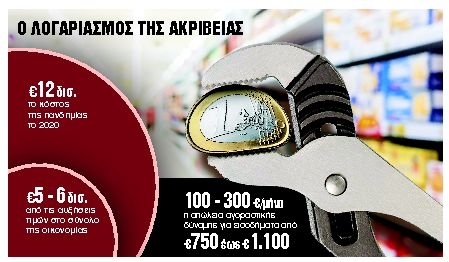The increase in prices has reduced the purchasing power of consumers by 300 euros per month and reduced GDP by 5-6 billion euros since the beginning of the year.
The first report on the consequences of the energy crisis for the first quarter of this year has been sent to the Ministry of Finance. Preliminary figures show that the increase in prices cost 5-6 billion euros, that is, about 3% of GDP.
In a difficult year of the health crisis, when the strictest quarantine measures were introduced (2020), the economy recorded losses of about 12.7 billion euros. According to the Central Bank, the economic cost of restrictive measures in terms of gross value added for the entire economy in 2020 is estimated at 7.7% with real GDP of 165.8 billion euros.
And today, as time passes, Greek households will continue to be in this “uncomfortable position” until at least mid-2023. Loans, as well as pressure on disposable income due to high inflation and rising basic spending, are bringing citizens to their knees.
According to economists, the rise in prices for oil and natural gas, fuel and other “cost” GDP this year, about 5-6 billion euros. The Greek Ministry of Finance reports that if, for example, growth was 0%, then along with inflation, a decline of about 2-3% would be recorded.
Investments and support measures are a lifeline for GDP. According to the Ministry of Finance, investments in the three years 2020, 2021, 2022 increased by about 30%, and government investments next year will amount to 12 billion euros. In addition, the state budget includes €8.3bn in rescue measures: €3.5bn for households and €4.8bn for businesses, to address rising electricity and gas costs for households and businesses. .
According to preliminary EΛΣΤΑT data, gross disposable income increased by 1.7% in the second quarter of 2022 compared to the second quarter of 2021, but real disposable income declined. Inflation rose by an average of 11.2% in the same quarter, while real disposable income fell by -9.5% in the second quarter of 2022.
According to economists, as well as the Bank of Greece, “pressure on the economy” is expected to continue in the first months of 2023. According to a survey by the Labor Institute ΓΣΕΕ, due to rising prices in combination with very low household incomes, the loss of purchasing power is growing at an accelerated pace (up to 40%), i.e. reaching 300 euros per month. For example, an average income of 1100 euros per month means a loss of 9% and 14%, that is, an additional 99-154 euros per month. In the highest income groups, the loss in purchasing power is less than 11%.







More Stories
Greece: growth in deposits from households and businesses in March 2024
How much will it cost a Greek family to celebrate Easter?
EU employment record: Greece "stuck" in a low position